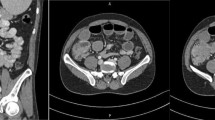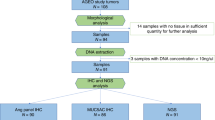Abstract
Medullary carcinoma of the colon is a rare variant of colorectal cancer claimed to have a more favorable prognosis than conventional adenocarcinomas. The histopathologic appearance may be difficult to distinguish from poorly differentiated adenocarcinoma. The study aimed to evaluate the diagnostic interobserver agreement and to characterize the immunohistochemical and molecular differences between these two subgroups. Fifteen cases initially classified as medullary carcinoma and 30 cases of poorly differentiated adenocarcinomas were included. Two pathologists reviewed the slides independently without knowledge of the original diagnosis and subgrouped the tumors into the two entities. Agreement was reached in 31 of 45 cases (69 %) with kappa = 0.32. An extensive immunohistochemical panel was performed, and KRAS, NRAS, and BRAF mutational status was assessed. Of the 31 cases with diagnostic agreement, the expression of only MLH-1 along with corresponding expression of PMS-2 differed significantly (p = 0.04). A high rate of BRAF mutations was detected in both subgroups without significant differences. Expression of MLH-1 was superior in dividing the tumors into two separate entities with significant differences in CK20 (p = 0.005) expression and in the rate of BRAF mutations (p = 0.0035). In conclusion, medullary carcinomas of the colon are difficult to discriminate from poorly differentiated adenocarcinoma even with the help of immunohistochemical and molecular analyses. This raises the question whether these morphological subtypes should be maintained or whether an alternative classification of poorly differentiated colorectal adenocarcinomas based on MLH-1 status rather than morphology should be suggested.

Similar content being viewed by others
References
Ferlay J, Soerjomataram I, Ervik M et al. GLOBOCAN 2012 v1.0, Cancer Incidence and Mortality Worldwide: IARC CancerBase No. 11.[Internet]. Lyon, France: International Agency for Research on Cancer; 2013. Available at: http://globocan.iarc.fr. Accessed 1 July 2014.
Thirunavukarasu P, Sathaiah M, Singla S et al (2010) Medullary carcinoma of the large intestine: a population based analysis. Int J Oncol 37(4)
Danish Colorectal Cancer Group, Annual Report 2012. Available at: http://dccg.dk. Accessed 1 July 2014
Hamilton SR, Bosman FT, Boffeta P et al (2010) Carcinoma of the colon and rectum. In: Bosman FT, Carneiro F, Hruban RH et al, eds. WHO Classification of Tumours of the Digestive System. Lyon: International Agency for Research on Cancer; 131–182
Jesserun J, Romero-Guadarrama M, Manivel J (1999) Medullary adenocarcinoma of the colon: clinicopathologic study of 11 cases. Hum Pathol 30(7):843–848
Sugao Y, Yao T, Kubo C et al (1997) Improved prognosis of solid-type poorly differentiated colorectal adenocarcinoma: a clinicopathological and immunohistochemical study. Histopathology 31:123–133
Wick MR, Vitsky JL, Ritter JH et al (2005) Sporadic medullary carcinoma of the colon: a clinicopathologic comparison with nonhereditary poorly differentiated enteric-type adenocarcinoma and neuroendocrine colorectal carcinoma. Am J Clin Pathol 123:56–65
Winn B, Tavares R, Fanion J et al (2009) Differentiating the undifferentiated: immunohistochemical profile of medullary carcinoma of the colon with an emphasis on intestinal differentiation. Hum Pathol 40:398–404
Arai T, Esaki Y, Sawabe M et al (2004) Hypermethylation of the hMLH1 promoter with absent hMLH1 expression in medullary-type poorly differentiated colorectal adenocarcinoma in the elderly. Mod Pathol 17:172–179
Lanza G, Gafa R, Matteuzzi M et al (1999) Medullary-type poorly differentiated adenocarcinoma of the large bowel: a distinct clinicopathologic entity characterized by microsatellite instability and improved survival. J Clin Oncol 17:2429–2438
Rüschoff J, Dietmaier W, Lüttges J et al (1997) Poorly differentiated colonic adenocarcinoma medullary type. Am J Pathol 150:1815–1825
Alexander J, Watanabe T, Wu TT et al (2001) Histopathological identification of colon cancer with microsatellite instability. Am J Pathol 158:527–535
Hinoi T, Tani M, Lucas PC et al (2001) Loss of CDX2 expression and microsatellite instability are prominent features of large cell minimally differentiated carcinomas of the colon. Am J Pathol 159:2239–2248
Winn B, Tavares R, Matoso A et al (2010) Expression of the intestinal biomarkers guanylyl cyclase C and CDX2 in poorly differentiated colorectal carcinomas. Hum Pathol 41:123–128
Hansen TP (2002) Immunohistochemical tumor markers in colorectal cancer: a methodological and prognostic study. University of Southern Denmark, Odense
Smith DH, Fiehn AM, Fogh L et al (2014) Measuring ERCC1 protein expression in cancer specimens: validation of a novel antibody. Sci Rep 4:4313
Kim JH, Rhee YY, Bae JM et al (2013) Loss of CDX2/CK20 expression is associated with poorly differentiated carcinoma, the CpG island methylator phenotype, and adverse prognosis in microsatellite-unstable colorectal cancer. Am J Surg Pathol 37:1532–1541
Xiao H, Yoon YS, Hong SM et al (2013) Poorly differentiated colorectal cancers: correlation of microsatellite instability with clinicopathologic features and survival. Am J Clin Pathol 140:341–347
Chetty R, Govender D (2013) Gene of the month: KRAS. J Clin Pathol 1–3
Herreros-Villanueva M, Chen CC, Yuan SS et al (2014) KRAS mutations: analytical considerations. Clin Chim Acta 431C:211–220
Vogelstein B, Fearon ER, Hamilton SR et al (1988) Genetic alterations during colorectal-tumor development. N Engl J Med 319:525–532
Patel GS, Karapetis CS (2013) Personalized treatment for advanced colorectal cancer: KRAS and beyond. Cancer Manag Res 5:387–400
Chen D, Huang JF, Liu K et al (2014) BRAFV600E mutation and its association with clinicopathological features of colorectal cancer: a systematic review and meta-analysis. PLoS One 9:e90607
Cunningham D, Atkin W, Lenz HJ et al (2010) Colorectal cancer. Lancet 375:1030–1047
Govender D, Chetty R (2012) Gene of the month: BRAF. J Clin Pathol 65:986–988
Kim ST, Park KH, Shin SW et al (2014) Dose KRAS mutation status affect on the effect of VEGF therapy in metastatic colon cancer patients? Cancer Res Treat 46:48–54
Bertagnolli MM, Niedzwiecki D, Compton CC et al (2009) Microsatellite instability predicts improved response to adjuvant therapy with irinotecan, fluorouracil, and leucovorin in stage III colon cancer: Cancer and Leukemia Group B Protocol 89803. J Clin Oncol 27:1814–1821
Zaanan A, Flejou JF, Emile JF et al (2011) Defective mismatch repair status as a prognostic biomarker of disease-free survival in stage III colon cancer patients treated with adjuvant FOLFOX chemotherapy. Clin Cancer Res 17:7470–7478
Jacquemier J, Reis-Filho JS, Lakhani SR et al (2012) Carcinomas with medullary features. In: Lakhani SR, Ellis IO, Schnitt SJ et al, eds. WHO Classification of Tumours of the Breast. Lyon: International Agency for Research on Cancer; 46–47
Longacre TA, Ennis M, Quenneville LA et al (2006) Interobserver agreement and reproducibility in classification of invasive breast carcinoma: an NCI breast cancer family registry study. Mod Pathol 19:195–207
Park I, Kim J, Kim M et al (2013) Comparison of the characteristics of medullary breast carcinoma and invasive ductal carcinoma. J Breast Cancer 16:417–425
Disclosure
No financial support has been received.
Conflicts of interest
No conflicts to be declared.
Author information
Authors and Affiliations
Corresponding author
Rights and permissions
About this article
Cite this article
Fiehn, AM.K., Grauslund, M., Glenthøj, A. et al. Medullary carcinoma of the colon: can the undifferentiated be differentiated?. Virchows Arch 466, 13–20 (2015). https://doi.org/10.1007/s00428-014-1675-6
Received:
Revised:
Accepted:
Published:
Issue Date:
DOI: https://doi.org/10.1007/s00428-014-1675-6




